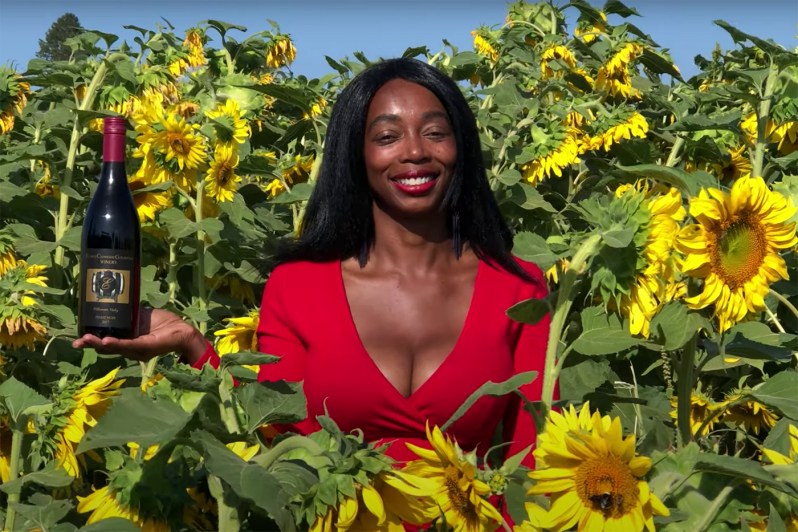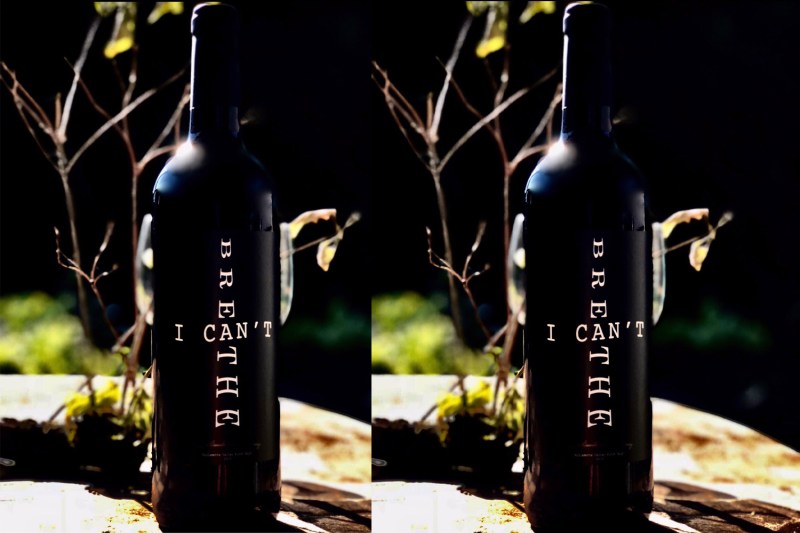
In Oregon’s famed Willamette Valley, there’s a new producer in town. She is Eunice Chiweshe Goldstein and she’s Oregon’s first Black female vintner and winery owner (she’s since been joined by Donna Stoney, who makes some tasty stuff under her eponymous label). Goldstein has wasted no time making her mark, dropping a Black Lives Matter Pinot Noir in the midst of a colossal social justice movement. She’s of the mind that brands should take a stand, and she’s living up to her word.
Related Reading
Meet Eunice, Oregon’s first Black female winemaker

As a kid, Goldstein would watch her grandparents brew beer and make wine in their native Zimbabwe. It sparked an interest in all things craft. The appreciation grew as a film student at UCLA and in 2017, she visited Oregon for the first time. “All the beautiful trees and nature were truly breathtaking and I knew at that moment that this was the right place,” she recalls. The region was so compelling that she purchased land in Oregon in 2017.
Along the way, Goldstein has scored some big roles in the film and television realm. She acted in the 2019 film Kevin Hart’s Guide to Black History. Prior to that, in 2016, she played a small part in the esteemed HBO series Westworld. She’s been involved on the production and screenwriting sides of the entertainment business coin, too.
Goldstein’s two main interests — film directing and wine — were both industries that lacked diversity. She admits that that alone was challenging, that she didn’t necessarily look like your typical Hollywood higher-up or Willamette Valley vintner. “Growing up, my parents encouraged us to pursue our goals and dreams,” she says.
“To me, pursuing a film directing and winemaking career all seemed normal. Although there are not many people in these fields who share my resemblance, I am grateful for our ancestors who paved the way, as well as my loved ones and family who continue to inspire and encourage me to press on.”
The wine world, it seems, is finally coming to. For decades, like so many other industries, it repeatedly stalled out, staying relatively insular and catered primarily to a certain group of people. Largely, it still does. But at long last, all the talk around evolving and adapting to how the world really is seems to be inspiring some action.
Black Lives Matter Pinot Noir

With her winery, it’s about way more than wine. Sure, a lot of businesses deliver the right kind of hashtags and put BLM signs on their splash pages to show solidarity. But other businesses directly aid the greater good.
“Like all industries, my hope is that the Oregon wine scene continues to evolve to be more inclusive of Black winery owners and winemakers,” she says.
The Black Lives Matter Pinot Noir honors George Floyd, whose spring 2020 murder at the hands of law enforcement sparked outrage and calls for reform all over the globe. The label is simple and effective, a black backdrop with the chilling phrase “I Can’t Breathe” in the foreground. Since last June, the entirety of the wine’s proceeds have been relayed to the Black Lives Matter movement. It’s just one wine of many of her wines that both create community and serve a greater cause. To date, the label has teamed up with Oregon Food Bank, HALO Trust, Breast Cancer Awareness, Stone Soup, National Slavery & Human Trafficking Prevention and Airway Science for Kids, and the Brian Grant Foundation. A new charity is selected every month.
“My goal is to uplift charities and organizations in need,” she says. “Wine brings people together at the table and with that are the conversations to better humanity and spread love.”
How You Can Support
Goldstein works with Chardonnay and Pinot Noir. The latter is an especially temperamental variety that’s made Oregon wine country world famous. It’s another challenge she embraces fully and one she loves to dive into. Instead of running a winery in the Willamette Valley, she’s working out of Astoria, a small and eclectic coast town. She aspires to one day create a bed and breakfast to complement the winery and tasting room.
She’s enamored by the vinification process, from clone selection (115 and 777 are her favorites) to native fermentations, sugar levels, and barreling down wine. One of her favorite parts involves readying the fruit and one of the primary tasks of any harvest. “De-stemming the grape, it’s a meditative process,” she says. “I find it to be quite calming. It’s you and the grape!”
That kind of intimacy is passed on to her wines, made with care and quality. Presently, her work is all made from Willamette Valley fruit. But Goldstein has visions for her brand that are unexpected and could lead to very interesting results. Currently, she’s experimenting with vines right along the Oregon coast in Rockaway, where they’ve never grown before.
If you want to learn more and shop Eunice Chiweshe Goldstein Winery be sure to check out her online store. From Rosé to special edition Pinot Noir, you’ll find something that you can enjoy while knowing your supporting Oregon’s first female Black winery owner.
This feature is part of our Brands Giving Back Series, where we’ll bring you all the latest news on brands that are giving back to the community, and how you can support by shopping online.


